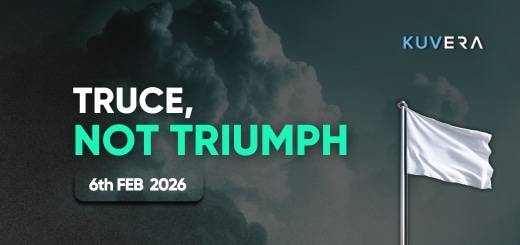In this edition, we talk about expectations from the government’s upcoming budget and quarterly earnings of tech companies as well as Reliance Industries. We also talk about automakers gearing up to launch more electric vehicles and India’s space industry hitting a new milestone.
Welcome to Kuvera’s weekly digest on the most critical developments related to business, finance, and the markets.
tl;dr Hear the article in brief instead?

The key to happiness in life, say some wise people, is low expectations. Because, you see, expectations can often lead to great disappointment and take away our mental peace.
Some other wise people disagree. Expectations, they say, can also result in great joy and are the key to achieving success and everything else in life.
Why are we philosophising about expectations?
Well, because it’s that time of the year when everyone is busy listing out their expectations — the unemployed and the salaried, the middle class and the wealthy, the penny-pinching consumers and the tax-savvy investors — from India’s finance minister.
So, what do people really expect from finance minister Nirmala Sitharaman as she gets ready to present the budget on February 1?
Let’s start with what matters the most to readers of this newsletter. The Association of Mutual Funds in India has presented a wishlist of about a dozen recommendations. We won’t go into each one, but the most important among those is the restoration of indexation benefits on debt funds and aligning the capital gains tax on such schemes with the rates applicable on bonds.
Two industry lobby groups, the Federation of Indian Chambers of Commerce & Industry (FICCI) and the Confederation of Indian Industry (CII), also want tax changes. While FICCI wants the government to simplify tax rules to help businesses, the CII suggested a cut on taxes on fuel and a reduction in income tax for those earning up to Rs 20 lakh. The CII also wants a higher allocation to the rural job guarantee scheme and providing cash vouchers to lower-income people.
In addition, the CII wants the government to step up infrastructure spending to lift economic growth that is slowing to a four-year low.
The Federation of Indian Export Organisations’ (FIEO) said the government should work out schemes or rationalise duties to increase exports, especially in areas such as electronics, automobiles, chemicals and textiles, and set up its own shipping line. These efforts can help India to take on China, which recorded a $1 trillion trade surplus in 2024.
Broadly, almost everyone wants Sitharaman to reduce the tax burden and offer incentives to various industries or interest groups.
Will she pay heed to the suggestions? Will the budget make our lives easier? How will it affect our investments? We don’t know, of course, and we won’t hazard a guess, either.
So, all we will say to the readers of this newsletter is not to let the budget or any other event beyond your control stop you from doing what you need to do. What about our expectations? To borrow from John C. Bogle, the American investor and founder of the Vanguard Group, have rational expectations and don’t allow short-term noise to change those expectations.
If Wishes Had Wheels
While we don’t know whether the budget will add more money into your pockets, we do know what to do with the money if you have it already—buy an electric vehicle!
Automotive enthusiasts in India are set to have more options if they are in the market for electric cars and SUVs with automakers unveiling new EV models at a five-day motor show that began in Greater Noida, near New Delhi, this week.
India’s EV market is currently dominated by Tata Motors and JSW-MG Motor, a joint venture of Sajjan Jindal JSW Group and China’s SAIC Motor, with Mahindra & Mahindra and China’s BYD also having a presence. Japanese and Korean companies have been slow to make a move thus far but are now switching on their EV plans.
While Tata Motors and JSW-MG will present an expanded line-up of their EV models at the Auto Expo 2025, Maruti Suzuki will showcase the e-Vitara SUV, its first EV that will roll out later this year. South Korea’s Hyundai, which recently floated a mega IPO in India, will unveil the Creta EV, the electric version of its best-selling model in the country.
Vietnamese EV maker VinFast, which is setting up a factory in Tamil Nadu, will display its VF3 and VF9 models while China’s BYD, which has overtaken Elon Musk’s Tesla as the world’s largest EV company, will show its Sealion 7 SUV.
Overall, car companies are likely to launch almost 10-12 new EVs in India this year. These launches come at a time when India’s auto market is showing signs of a slowdown after two years of rapid growth. But new EV models that offer more features, a longer driving range and faster charging are critical to pushing sales higher.
To be sure, many of these models will be at the premium end of the segment and burn a big hole in your pockets. But if you have it, splurge it and enjoy your drive!
Wishing for Better Earnings
Going back to expectations, India’s top three IT companies expect an improvement in demand as they reported their results for the October-December quarter.
Infosys, the No.2 software services exporter, led the expectations higher this week as it lifted its annual revenue growth forecast to 4.5-5% from 3.75-4.5% earlier.
Infosys also exceeded analysts’ expectations for revenue and profit in the third quarter thanks to an increase in sales from North America, which accounts for almost 60% of its topline. The company’s Q3 revenue climbed 7.6% to Rs 41,764 crore while profit rose 11.4% to Rs 6,806 crore.
HCL Tech, India’s third-largest IT company, missed analysts’ expectations as revenue grew 5.1% to Rs 29,890 crore. But its net profit inched up 5.5% to Rs 4,591 crore, matching estimates. The company said it expects FY25 revenue to grow 4.5-5% from 3.5-5% previously.
Tata Consultancy Services, the industry leader, missed analysts’ expectations last week but signalled a revival in coming quarters. The company’s Q3 consolidated revenue increased 5.6% to Rs 63,973 crore while net profit rose 12% to Rs 12,380 crore, slightly below market estimates.
Wipro, the No. 4 IT company, topped market estimates though its consolidated revenue rose only 0.5% to Rs 22,319 crore while Tech Mahindra missed expectations with its revenue rising 1.4% to Rs 13,286 crore.
Other big companies that reported results this week included Reliance Industries and Axis Bank. Billionaire Mukesh Ambani-led Reliance, India’s biggest company by market value, exceeded expectations as its retail and telecom units outperformed its flagship oils-to-chemicals business.
Reliance’s consolidated net profit climbed 7.4% to Rs 18,540 crore as revenue grew 7% to Rs 2.44 trillion. Revenue from the oils-to-chemicals business increased 6% to Rs 1.5 trillion. Reliance Retail’s revenue increased 7% to Rs 79,595 crore thanks to festive season demand while Reliance Jio Infocomm posted a 24% jump in profit to Rs 6,477 crore as it benefited from tariff hikes.
Axis Bank missed analysts’ estimates as loan growth slowed and provisions against potential bad loans rose. The bank’s Q3 standalone net profit grew just 4% to Rs 6,304 crore while provisions more than doubled to Rs 2,156 crore. The bank’s loans and deposits grew 9% each. Net interest income also rose 9% to Rs 13,606 crore, missing estimates.
Wishing for a Spacewalk
Moving on to expectations that push us to explore new horizons, the Indian Space Research Organization achieved a new milestone this week when it successfully managed an unmanned docking in space.
This makes India only the fourth country in the world—after the US, Russia and China—to achieve this feat, and strengthens its position as a major space power.
So, what’s docking and why does it matter? We won’t go into the depths of space technology but here’s the gist.
Essentially, docking refers to joining two spacecraft or satellites together to create an airtight passage. This passage can then be used to transfer crew, equipment and other material.
ISRO’s mission—the Space Docking Experiment (SpaDex)—involved sending two spacecraft into low-earth orbit from the Satish Dhawan Space Center in Andhra Pradesh on December 30 aboard a Polar Satellite Launch Vehicle.
ISRO had twice postponed the docking experiment earlier this month because of technical issues. But it succeeded in its third attempt. It isn’t done though, and will now try to transfer electric power from one spacecraft to another.
The docking technology is critical for space missions, and it takes India a step forward in meeting its goals. ISRO had landed a spacecraft on the moon in 2023 as part of the Chandrayaan-3 mission. Now, it wants to collect moon samples by 2027, launch a mission to Venus in 2028, build a space station by 2035, and put an astronaut on the moon by 2040.
ISRO wasn’t the only Indian space organisation busy this week. Indian space-tech startups Pixxel, Digantara and XDLINX this week launched their satellites aboard a SpaceX rocket from the Vandenberg Space Force Base in California.
While Pixxel, a five-year-old startup that counts Google as an investor, launched three satellites, Digantara and XDLINX launched one each. These satellites will be used in industries such as agriculture, mining, communications, defence and environmental monitoring. The startups want to launch more satellites. Pixxel alone will deploy three more satellites in the next quarter and 18 more thereafter. For India’s nascent private space sector, the sky’s the limit!
Market Wrap
India’s stock markets remained wobbly this week with both the BSE Sensex and the NSE Nifty falling nearly 1% each. Last week, the two indices had lost about 2.6%.
Stock markets have been slipping for the past several weeks as foreign institutional investors continue to pull out capital from India. In January so far, foreign portfolio investors have withdrawn more than Rs 40,000 crore from Indian equities, NSDL data show.
Foreign portfolio outflows also put pressure on the rupee, dragging it down to a record low past 86.50 to the dollar. The rupee fell 0.6% during the week, logging its 11th week of declines in a row.
Technology stocks led the drop this week with the Nifty IT index losing 5.8%. Infosys and HCL Tech were the biggest Nifty losers this week, slumping 7.7% and 10%, respectively. Wipro was close behind, losing more than 6%.
Other Nifty stocks that slipped during the week were Axis Bank and Tech Mahindra, which both missed analyst estimates for quarterly results, as well as Mahindra & Mahindra and Trent. Hindustan Unilever, Apollo Hospitals, Dr Reddy’s Labs, UltraTech and Asian Paints were the other major losers.
Nifty gainers were led by Hindalco and state-run companies NTPC and Coal India. Reliance rose more than 4% for the week after beating results expectations. Insurance companies HDFC Life and SBI Life as well as Adani Ports and Maruti Suzuki were the other major gainers.
Other Headlines
- Retail inflation slows to four-month low of 5.22% in December from 5.48% in November
- Wholesale inflation picks up pace in December, up at 2.37% vs 1.89% in November
- Dubai’s Burj Khalifa builder Emaar in talks with Adani, others to sell stake in Indian unit
- LTIMindtree Q3 consolidated revenue rises 7.1% to Rs 9,661 crore, profit falls 7.1% to Rs 1,085 crore
- Shoppers Stop Q3 consolidated net profit rises 41% to Rs 52.23 crore on festive season sales
- Telangana govt rations supplies of Kingfisher beer after United Breweries suspends sales over price dispute
- SEBI approves JSW Cement’s Rs 4,000-crore IPO after putting it on hold for four months
- RBI deputy governor M. Rajeshwar Rao to head monetary policy division as Michael Patra’s term ends
- Uttar Pradesh govt looks to privatise Dakshinanchal Vidyut Vitran Nigam and Purvanchal Vidyut Vitran Nigam
- India’s imports of finished steel jump 20.3% to six-year high of 7.27 million metric tons during April-December
- Retail inflation slows to four-month low of 5.22% in December from 5.48% in November
- United Spirits appoints HT Media’s Praveen Someshwar as new CEO
- Aditya Birla Fashion to raise $500 million via a preferential issue, institutional share sale
- Jack Daniel’s maker Brown-Forman to lay off 12% of 5,400 employees globally
- Growth in car sales by automakers to dealers slows to four-year low of 4.2% in 2024: SIAM
- India’s net direct tax collection rise 16% during April-January to Rs 16.90 trillion
That’s all for this week. Until next week, happy investing!
Interested in how we think about the markets?
Read more: Zen And The Art Of Investing
Watch here: Investing in International Markets
Start investing through a platform that brings goal planning and investing to your fingertips. Visit kuvera.in to discover Direct Plans and Fixed Deposits and start investing today. #MutualFundSahiHai #KuveraSabseSahiHai












